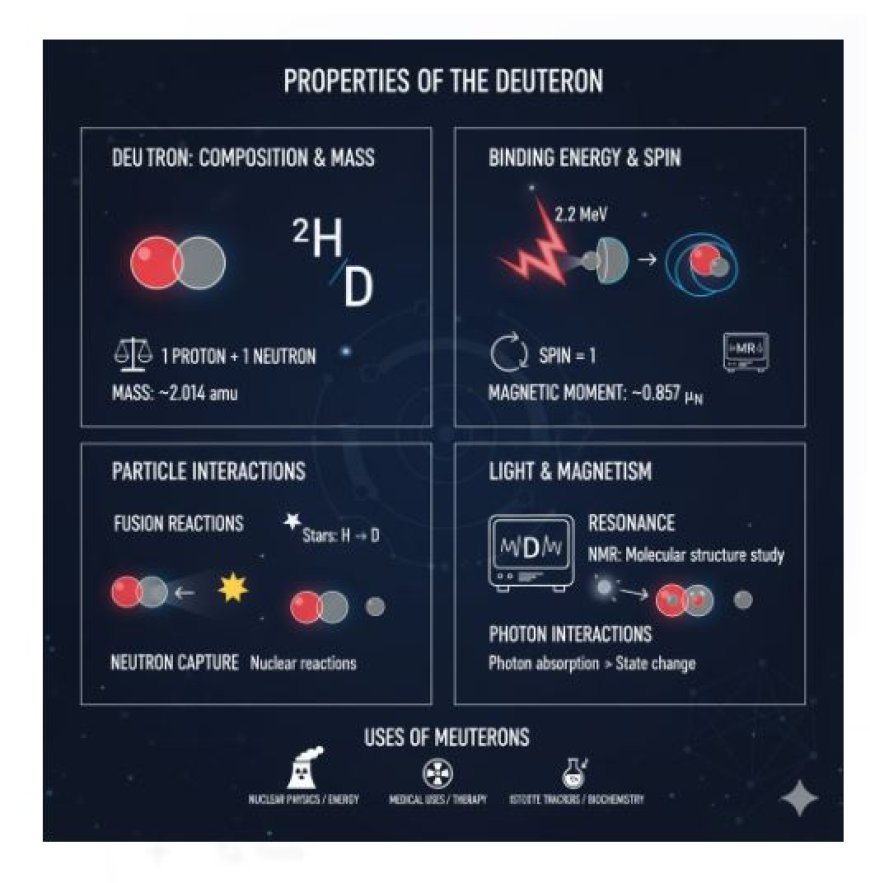Properties of Deuteron
Learn about the properties of the deuteron, the nucleus of deuterium. Explore its composition, mass, binding energy, spin, magnetic moment, and applications in nuclear fusion, NMR, isotope studies, and medical research.

Properties of Deuteron
- The deuteron is a basic particle in nuclear physics and one of the simplest atomic nuclei. Studying it helps us understand how atoms bond and respond.
Deuteron
- A deuteron is the core of deuterium, which is a type of hydrogen. It has one proton and one neutron, which makes it steady.
- The deuteron is usually represented by the sign D or ²H, where the number 2 shows its mass.
Important Features of Deuteron
1. Composition
- Protons and Neutrons: A deuteron is made of one proton and one neutron, while regular hydrogen only has one proton.
2. Mass
- Mass Number: The mass number of a deuteron is 2, which comes from 1 proton and 1 neutron.
- A deuteron has a mass of about 2.014 atomic mass units (amu), which is roughly twice the mass of a proton.
3. Binding Energy
- Definition: Binding energy is the energy needed to break a nucleus apart into its protons and neutrons.
- The bond energy of the deuteron is about 2.2 MeV (mega-electron volts). This shows that a lot of energy is needed to hold the particles in the nucleus together.
4. Spin and Magnetic Features
- The deuteron has a total spin of 1, which comes from the spins of the proton and neutron it is made of.
- Magnetic Moment: The deuteron has a magnetic moment of about 0.857 nuclear magnetons because of its makeup and spin. This is important for uses like NMR (Nuclear Magnetic Resonance).
How Particles Interact with Each Other
1. Fusion Reactions
- Importance of Deuterons: Deuterons are important in nuclear fusion, especially in stars like the sun, where hydrogen nuclei (protons) join together to create deuterons during the proton-proton chain reaction.
2. Neutron Capture
- Nuclear Reactions: Deuterons can combine with neutrons, which leads to different nuclear reactions. This interaction is important for study and nuclear technology.
Light and Magnetism Features
1. Resonance
- Nuclear Magnetic Resonance (NMR): The unique magnetic qualities of deuterons make them useful for NMR studies, which help scientists in chemistry and biology understand molecule structures.
2. Photon Interactions
- Photon Interactions: Deuterons can take in photons and change states, which is important for understanding nuclear processes and their properties.
Uses of Deuterons
1. Research and Development
- Nuclear Physics: Deuterons are used in nuclear power plants and labs to study nuclear forces and processes.
- Medical Uses: They are used in some medical scans and treatments, like proton therapy for cancer.
2. Isotope Studies
- Chemical Tracers: Deuterium and deuterons are used in biochemistry and environmental studies to record and monitor processes with stable isotopes.
What's Your Reaction?



































